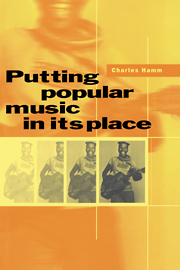Book contents
- Frontmatter
- Contents
- Acknowledgements
- Preface
- 1 Modernist narratives and popular music
- 2 Rock and the facts of life
- 3 Changing patterns in society and music: the US since World War II
- 4 “If I Were a Voice”: or, The Hutchinson Family and popular song as political and social protest
- 5 Some thoughts on the measurement of popularity in music
- 6 Elvis, a review
- 7 Home cooking and American soul in black South African popular music
- 8 Rock ‘n’ roll in a very strange society
- 9 African-American music, South Africa, and apartheid
- 10 “The constant companion of man”: Separate Development, Radio Bantu, and music
- 11 Privileging the moment of reception: music and radio in South Africa
- 12 Music and radio in the People's Republic of China
- 13 Towards a new reading of Gershwin
- 14 A blues for the ages
- 15 Graceland revisited
- 16 Dvořák in America: nationalism, racism, and national race
- 17 The last minstrel show?
- 18 The Role of Rock, a review
- 19 Genre, performance, and ideology in the early songs of Irving Berlin
- 20 Epilogue: John Cage revisited
- Index
9 - African-American music, South Africa, and apartheid
Published online by Cambridge University Press: 05 February 2012
- Frontmatter
- Contents
- Acknowledgements
- Preface
- 1 Modernist narratives and popular music
- 2 Rock and the facts of life
- 3 Changing patterns in society and music: the US since World War II
- 4 “If I Were a Voice”: or, The Hutchinson Family and popular song as political and social protest
- 5 Some thoughts on the measurement of popularity in music
- 6 Elvis, a review
- 7 Home cooking and American soul in black South African popular music
- 8 Rock ‘n’ roll in a very strange society
- 9 African-American music, South Africa, and apartheid
- 10 “The constant companion of man”: Separate Development, Radio Bantu, and music
- 11 Privileging the moment of reception: music and radio in South Africa
- 12 Music and radio in the People's Republic of China
- 13 Towards a new reading of Gershwin
- 14 A blues for the ages
- 15 Graceland revisited
- 16 Dvořák in America: nationalism, racism, and national race
- 17 The last minstrel show?
- 18 The Role of Rock, a review
- 19 Genre, performance, and ideology in the early songs of Irving Berlin
- 20 Epilogue: John Cage revisited
- Index
Summary
More precipitously than any other area of the globe, Africa was moving into the postmodern world in the 1970s and 80s. One of the cornerstones of the modern era, colonialism, had collapsed, and attempts by emergent African nation-states to emulate the modernist socio-political systems of capitalism and socialism/Communism were proving to be problematic. Everything was in flux.
It was just at this time that many popular-music scholars were embracing the Marxist-grounded, theoretical discourse that was dominating European intellectual life. Though I found this movement to be intellectually stimulating, I felt distanced from much of the resultant literature, particularly when it focused narrowly on European class struggle; it seemed to have little relevance to the battles taking place in southern Africa over the meaning of popular music.
By the time I returned to Africa in the late summer of 1984, for a stay of nine months, my work had focused on three separate but interlocking topics: social and musical relations between black Americans and the black population of South Africa; the history of “jive,” acontemporary popular genre in southern Africa; and the role of music in the complex and apparently highly successful media strategy of the minority white government.
Expanding on the previous article, this monograph develops the first of these issues at length, examining the musical life of black South Africans since the middle of the nineteenth century in the context of its interaction with the culture and music of black Americans.
- Type
- Chapter
- Information
- Putting Popular Music in its Place , pp. 167 - 209Publisher: Cambridge University PressPrint publication year: 1995



